|
|
|
Sort Order |
|
|
|
Items / Page
|
|
|
|
|
|
|
| Srl | Item |
| 1 |
ID:
160993
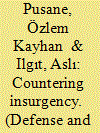

|
|
|
|
|
| Summary/Abstract |
Insurgents often develop international connections and benefit from external assistance from a variety of sources. Support from diaspora communities has long been considered one of the critical external factors in the persistence of insurgent groups. Yet how the counterinsurgent state addresses external support from transnational ethnic communities and what factors influence the state's policies remain understudied. By focusing on the transnational political practices of the Kurdish community and the PKK in Western Europe, this paper examines how Turkey has addressed the diasporic support for the PKK since the 1980s. It shows that three major factors – the composition of foreign policy decision-makers, their ideological contestation over the Kurdish question, and the European political context – have affected Turkey's policy regarding the PKK's transnational dynamics in Europe.
|
|
|
|
|
|
|
|
|
|
|
|
|
|
|
|
| 2 |
ID:
107533
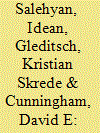

|
|
|
|
|
| Publication |
2011.
|
| Summary/Abstract |
Many rebel organizations receive significant assistance from external governments, yet the reasons why some rebels attract foreign support while others do not is poorly understood. We analyze factors determining external support for insurgent groups from a principal-agent perspective. We focus on both the supply side, that is, when states are willing to support insurgent groups in other states, and the demand side, that is, when groups are willing to accept such support, with the conditions that this may entail. We test our hypotheses using new disaggregated data on insurgent groups and foreign support. Our results indicate that external rebel support is influenced by characteristics of the rebel group as well as linkages between rebel groups and actors in other countries. More specifically, we find that external support is more likely for moderately strong groups where support is more likely to be offered and accepted, in the presence of transnational constituencies, international rivalries, and when the government receives foreign support.
|
|
|
|
|
|
|
|
|
|
|
|
|
|
|
|
| 3 |
ID:
190888
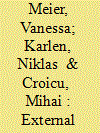

|
|
|
|
|
| Summary/Abstract |
In this article, we present the most up-to-date, fine-grained, global dataset on external support in armed conflicts: the UCDP External Support Dataset (ESD). The dataset encompasses data on states and non-state actors as both supporters and recipients and provides detailed information on the type of support provided to warring parties in armed conflicts between 1975 and 2017. We use it to highlight three broader trends in the provision of external support: (1) a dramatic increase in the number of external supporters, (2) a larger share of pro-government interventions, and (3) the rise of direct military intervention as the predominant mode of external support. In conclusion, we identify several avenues worthy of future inquiry that could significantly improve our understanding of external support in armed conflicts.
|
|
|
|
|
|
|
|
|
|
|
|
|
|
|
|
| 4 |
ID:
177754
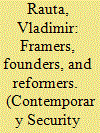

|
|
|
|
|
| Summary/Abstract |
The rapid expansion of the proxy war literature invites an examination of its advances and developments. This article’s aims are threefold. First, to assess proxy war literature with a view to understand how it has progressed knowledge. Second, to map the field’s effort to cumulate knowledge. Third, to think creatively about the future directions of this research agenda as it addresses a problem no longer at the periphery of contemporary security debates. This article proposes a novel categorization of the evolution of our thinking about proxy wars across three “generations”: founders, framers, and reformers. Following on from this, it provides an assessment of the literature’s assumptions in order to show what remains, or not, under-studied. In doing so, it makes a case for a historiography of the idea of “proxy war,” and one for embedding strategy in analyses of wars by proxy.
|
|
|
|
|
|
|
|
|
|
|
|
|
|
|
|
| 5 |
ID:
175334
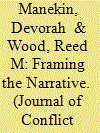

|
|
|
|
|
| Summary/Abstract |
Female combatants play a central role in rebel efforts to cultivate and disseminate positive narratives regarding the movement and its political goals. Yet, the effectiveness of such strategies in shaping audience attitudes or generating tangible benefits for the group remains unclear. We propose and test a theory regarding the channels through which female fighters advance rebel goals. We argue that female fighters positively influence audience attitudes toward rebel groups by strengthening observers’ beliefs about their legitimacy and their decision to use armed tactics. We further contend that these effects directly help them secure support from transnational nonstate actors and indirectly promote state support. We assess our arguments by combining a novel survey experiment in two countries with analyses of new cross-national data on female combatants and information about transnational support for rebels. The empirical results support our arguments and demonstrate the impact of gender framing on rebel efforts to secure support.
|
|
|
|
|
|
|
|
|
|
|
|
|
|
|
|
| 6 |
ID:
128574
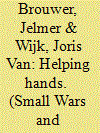

|
|
|
|
|
| Publication |
2013.
|
| Summary/Abstract |
This article analyses to what extent the Burmese KNU insurgency made use of external support from states, refugees, and diasporas. Based on extensive fieldwork it is concluded that support from neighbouring states and refugees has for years kept the Karen rebellion alive. Western countries perceived forms of resistance to the illegitimate Burmese regime as just and have therefore played a crucial role in the continuation of conflict in Karen State. It is important that policymakers and donors as well as executing organizations continue to reflect critically on the way they exercise their work.
|
|
|
|
|
|
|
|
|
|
|
|
|
|
|
|
| 7 |
ID:
186100
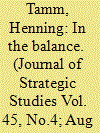

|
|
|
|
|
| Summary/Abstract |
The two main rebel groups in the Second Congo War (1998–2003) evolved in remarkably different ways. While the MLC maintained organisational cohesion throughout the war, the RCD split into two rival groups within less than a year. The larger of these rivals then remained cohesive, whereas the smaller group experienced further fragmentation. This article draws on interviews with key protagonists to show that these cross-group differences resulted from different patterns of state sponsorship. Fragmentation occurred when the intra-group distribution of power between a rebel leader and an internal rival hung in the balance because external troops supported both sides.
|
|
|
|
|
|
|
|
|
|
|
|
|
|
|
|
| 8 |
ID:
175191


|
|
|
|
|
| Summary/Abstract |
How does the anticipation of external support for both opposition groups and governments affect the likelihood and form (violent vs. nonviolent) of uprising within states? We develop a novel approach to address these issues, building on a network perspective. Our model suggests that both opposition groups and governments’ strategies are affected by an anticipation of the degree and nature of expected support by external parties (states and non-state actors). Using a set of indicators – including cultural affinity, strategic factors, and normative values – we develop a unique measure of anticipated support based on the potential support networks of target states and their opposition in order to evaluate our hypotheses. We argue that the anticipated balance of support for opposition and governments affects: (a) the likelihood of uprising and (b) the principal – violent or nonviolent – strategy used by the opposition group. We analyze data on violent and nonviolent civil conflicts over the period 1946–2010. We find that when the balance of anticipated support favors the opposition over their target government, the onset of an uprising is more likely. Specifically, the type of anticipated support has implications for whether a violent or nonviolent uprising occurs. These findings provide new insights into the role external support can play even before conflict occurs.
|
|
|
|
|
|
|
|
|
|
|
|
|
|
|
|
| 9 |
ID:
154845
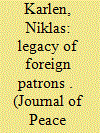

|
|
|
|
|
| Summary/Abstract |
Why do some armed conflicts that have ended experience renewed fighting while others do not? Previous research on conflict recurrence has approached this question by looking at domestic factors such as how the war was fought, how it ended or factors associated with its aftermath. With the exception of the literature on third-party security guarantees, the influence of outside actors has often been overlooked. This article explores the role of external states and suggests when and how their involvement is likely to affect the probability of renewed warfare. The main argument is that the legacy of outside support creates an external support structure that affects the previous combatants’ willingness as well as their opportunities to remobilize. This means that armed conflicts with external state support will experience a greater likelihood of recurrence compared to other conflicts which did not see external support. The theory is tested using Cox proportional hazards models on global data of intrastate armed conflicts 1975–2009. The findings suggest that external support to rebels increases the risk of conflict recurrence in the short term as groups receive or anticipate renewed assistance. The results also indicate that it is more important for rebel groups to have had enduring support over the years in the previous conflict rather than access to multiple state sponsors. External support provided to governments is not associated with conflict recurrence.
|
|
|
|
|
|
|
|
|
|
|
|
|
|
|
|
| 10 |
ID:
132214


|
|
|
|
|
| Publication |
2014.
|
| Summary/Abstract |
Militant organizations pursue two common aims: to survive and to achieve the goals that define their raison d'être. Yet, elements that sustain the life spans of militant organizations are not necessarily the same components that advance the accomplishment of their core, or "outcome," goals. Further, some organizational practices, such as the use of suicide attacks, generate a tradeoff that bolsters survivability while detracting from the effective pursuit of outcome goals. This study demonstrates that three operating conditions explain variation in the duration and achievement of contemporary militant organizations: receptiveness to tradeoffs, levels of external support, and the nature of adversaries. As such, the unique effects of different operating conditions reveal why many militant organizations survive for long periods of time but only a few achieve the goals that justify their existence.
|
|
|
|
|
|
|
|
|
|
|
|
|
|
|
|
| 11 |
ID:
139449
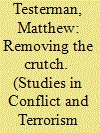

|
|
|
|
|
| Summary/Abstract |
Empirical analysis of civil wars wherein rebels receive support from outside states or actors confirms the expectation that such external support is correlated with conflicts that, on average, are longer than civil wars without external support. When this assistance is lost, the empirical results are at odds with the expectation that these wars should end more rapidly. Instead, wars in which there is a break in external support are more likely to continue into the next calendar year than even those wars with continued external support. This counterintuitive finding suggests a re-evaluation of theoretical foundations of external support to rebel groups.
|
|
|
|
|
|
|
|
|
|
|
|
|
|
|
|
| 12 |
ID:
163100
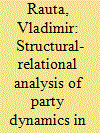

|
|
|
|
|
| Summary/Abstract |
Proxy wars are still under-represented in conflict research and a key cause for this is the lack of conceptual and terminological care. This article seeks to demonstrate that minimising terminological diffusion increases overall analytical stability by maximising conceptual rigour. The argument opens with a discussion on the terminological ambivalence resulting from the haphazard employment of labels referencing the parties involved in proxy wars. Here, the article introduces an analytical framework with a two-fold aim: to reduce label heterogeneity, and to argue in favour of understanding proxy war dynamics as overlapping dyads between a Beneficiary, a Proxy, and a Target. This is then applied to the issues of defining and theorising party dynamics in proxy wars. It does so by providing a structural-relational analysis of the interactions between the above-mentioned parties based on strategic interaction. It presents a tentative explanation of the proxy relationship by correlating the Beneficiary’s goal towards the Target with the Proxy’s preference for the Beneficiary. In adding the goal-preference relational heuristic, the article advances the recent focus on strategic interaction with a novel variant to explanations based on interest, power, cost–benefit considerations or ideology.
|
|
|
|
|
|
|
|
|
|
|
|
|
|
|
|
| 13 |
ID:
169278
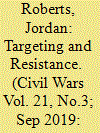

|
|
|
|
|
| Summary/Abstract |
This article draws a distinction between external support which primarily serves to enhance rebel capacity to offensively target vital state interests and support which primarily increases rebel capacity to defensively resist state repression. Targeting support increases a rebel group’s incentive to behave aggressively, and is found to be associated with a shorter conflict duration when given to strong groups and a higher probability of a decisive conflict outcome. Resistance support increases a rebel group’s incentive to prioritise survival, and is found to be associated with a longer conflict duration.
|
|
|
|
|
|
|
|
|
|
|
|
|
|
|
|
| 14 |
ID:
167022
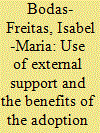

|
|
|
|
|
| Summary/Abstract |
The purpose of this paper is to examine the relationship between the use of external support for the adoption of resource efficiency practices and the extent and profitability of this adoption by Small and Medium-sized Enterprises (SMEs). We distinguish between direct financial support and indirect support in the form of advice and consulting services related to the adoption of resource efficiency practices. We use data from the 2013 FLASH EUROBAROMETER survey of a sample of European manufacturing SMEs. Our results show that the effects of the adoption of resource efficiency practices on production costs are higher among firms that receive external financial support for adoption, as well as among those firms that adopt a wide set of process reengineering measures for resource efficiency. However, external technical and business advice plays an important role in the extent of adoption of different resource efficiency measures.
|
|
|
|
|
|
|
|
|
|
|
|
|
|
|
|
| 15 |
ID:
165254
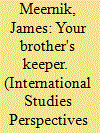

|
|
|
|
|
| Summary/Abstract |
States have long employed other actors, including other states and nonstate actors, as fighting forces to help them achieve the national security objectives that they are unwilling or incapable of realizing unilaterally. In the international courts in recent years, however, there has been the increasing willingness to hold individuals accountable for violations of international law committed by those forces to whom they are providing assistance. For example, the Special Court for Sierra Leone found President Charles Taylor of Liberia guilty of aiding and abetting forces in Sierra Leone that repeatedly violated international law and inflicted untold human suffering on the people of that country. After delineating the legal risks facing state leaders that provide support to third party actors, I delve into conflict data to determine just how widespread the problem is. I examine the frequency with which actors commit violations of international law, and in particular the targeting of innocent civilians, and the extent to which such forces are being assisted by external actors. I find that this problem is prevalent and that many major powers have provided assistance to allies that violate international law.
|
|
|
|
|
|
|
|
|
|
|
|
|
|
|
|
|
|
|
|
|